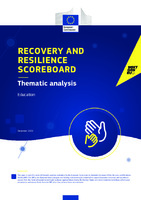| dc.contributor.author | European Commission |
| dc.date.accessioned | 2023-02-16T08:32:57Z |
| dc.date.available | 2023-02-16T08:32:57Z |
| dc.date.issued | 2021-12 |
| dc.identifier.uri | https://ketlib.lib.unipi.gr/xmlui/handle/ket/3912 |
| dc.description | This paper is part of a series of thematic analysis undertaken by the European Commission to illustrate the impact of the Recovery and Resilience Facility (RRF). The RRF is the European Union’s largest ever funding instrument and is intended to support European economies and societies to recover from the Covid-19 pandemic and build resilience against future shocks. EU Member States commit to implement ambitious reforms and investments and receive funds from the RRF when they achieve these commitments. |
| dc.description.abstract | Education and training systems1 across the EU are faced with key challenges that risk persisting or worsening
due to the COVID-19 pandemic. The basic skills proficiency of the younger generation has not improved during the past
decade. This is not only a worrying social issue, but also a drag on the EU’s future economic competitiveness and resilience.
The COVID-19 crisis has further emphasised the importance of basic and advanced digital skills for sustaining our economies
and societies. Significant efforts are necessary to reduce the share of pupils underachieving in digital skills across all EU
Member States. |
| dc.format.extent | 10p. |
| dc.language.iso | en |
| dc.publisher | Publications Office of the European Union |
| dc.subject | Pathways to School Success |
| dc.subject | Labour market relevance |
| dc.subject | Education and training |
| dc.subject | Initial vocational education |
| dc.title | Recovery and resilience scoreboard. Education. |
| dc.type | thematic analysis |
| dc.publisher.place | Luxembourg |

